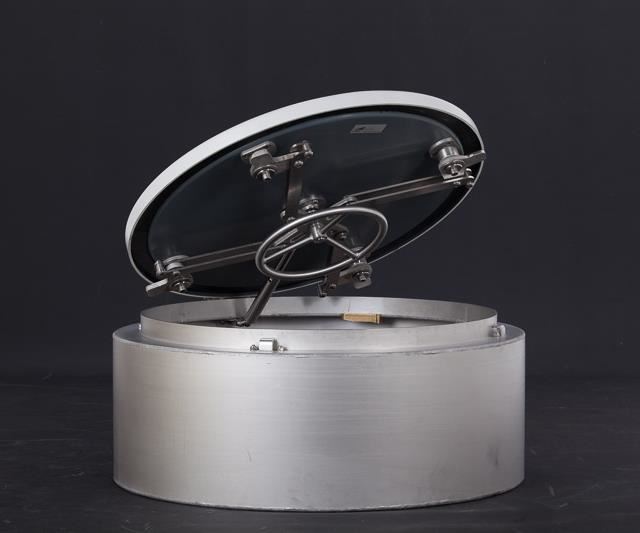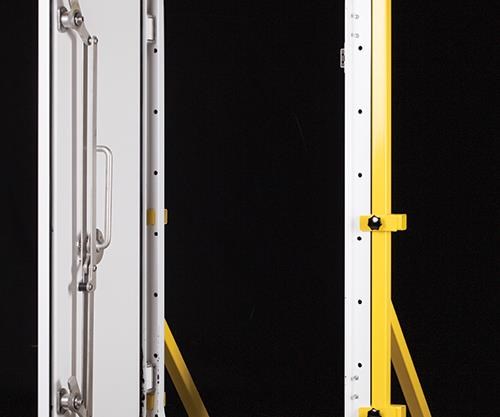Full steam ahead for composite ship doors and hatches
VABO Composites (Emmeloord, The Netherlands) has added to its wide range of composite products these ship doors and hatches that offer a 50% weight reduction vs. conventional steel doors.
Cost reduction, says Arnold Vaandrager, director of VABO Composites (Emmeloord, The Netherlands), is the most important factor in the commercial shipping world. To meet that need, VABO has added to its wide range of composite products (e.g., architectural structures, shovels/buckets for construction vehicles, 10m-tall radar masts for superyachts and manipulator doors and valves for pallet placement machines) ship doors and hatches that offer a 50% weight reduction vs. conventional steel doors. The composite design not only reduces fuel costs but also improves ergonomics and practically eliminates maintenance costs — repeated painting is no longer required. Another advantage is that vibration isolation, ballistic resistance and flame retardation also can be integrated into the part during manufacture.
The glass fiber/vinyl ester resin ship doors and hatches are produced under the brand name Accedoo — a contraction of access and door. Formed in high-precision aluminum molds via a resin transfer molding process, Accedoo composite doors and hatches comprise a series of standard dimensions and designs. In addition to these standard models, customer-specific dimensions can be provided using a modular mold system.
Having obtained maritime certification from Bureau Veritas (Paris, France), VABO Composites installed 12 Accedoo doors in May 2015 onboard the innovative, new-build fishing ship MDV-1 Immanuel in The Netherlands.
An acronym for Masterplan Sustainable Fishery (Masterplan Duurzame Visserij in Dutch), the MDV vessels aim to realize pioneering innovations in Dutch fishing. The 31m-long MDV-1 features a dynamic hull shape, designed using computational fluid dynamics and a hybrid diesel/electric propulsion system, reducing fuel burn from the current figure of roughly 4 liters per kilogram of average fish catch.
Due to cost, delivery time, regulations and recyclability issues, steel was chosen for the hull, and a composite superstructure is on the table for future builds. But Accedoo doors offered immediate savings, and research by The Institute for Energy and Environmental Research (IFEU, Heidelberg, Germany) showed that a busy cargo ship can achieve a return on investment (ROI), based on weight and fuel reduction for 12 composite doors and hatches, within the first 5 years of the vessel’s service life, and even more quickly for ships operating at speeds higher than the MDV-1’s average of 9 knots (e.g., ferries, at 20 knots).
Maritime Holland magazine reports that the MDV concept may indeed become the new standard in twin-rig North Sea fishing vessels, and none too soon given that much of the 275-vessel Dutch fleet — not to mention fleets from neighboring Denmark, Belgium, France and the UK — is aging and in need of replacement.
VABO Composites expects significant growth for its Accedoo products; it is now completing installation on two minesweepers in Italy and is pursuing increased market share by further industrializing production, including robotic automation that will enable cost parity with steel and ROI on doors/hatches from day one.
Related Content
-
Natural fiber composites: Growing to fit sustainability needs
Led by global and industry-wide sustainability goals, commercial interest in flax and hemp fiber-reinforced composites grows into higher-performance, higher-volume applications.
-
TU Munich develops cuboidal conformable tanks using carbon fiber composites for increased hydrogen storage
Flat tank enabling standard platform for BEV and FCEV uses thermoplastic and thermoset composites, overwrapped skeleton design in pursuit of 25% more H2 storage.
-
The potential for thermoplastic composite nacelles
Collins Aerospace draws on global team, decades of experience to demonstrate large, curved AFP and welded structures for the next generation of aircraft.


















